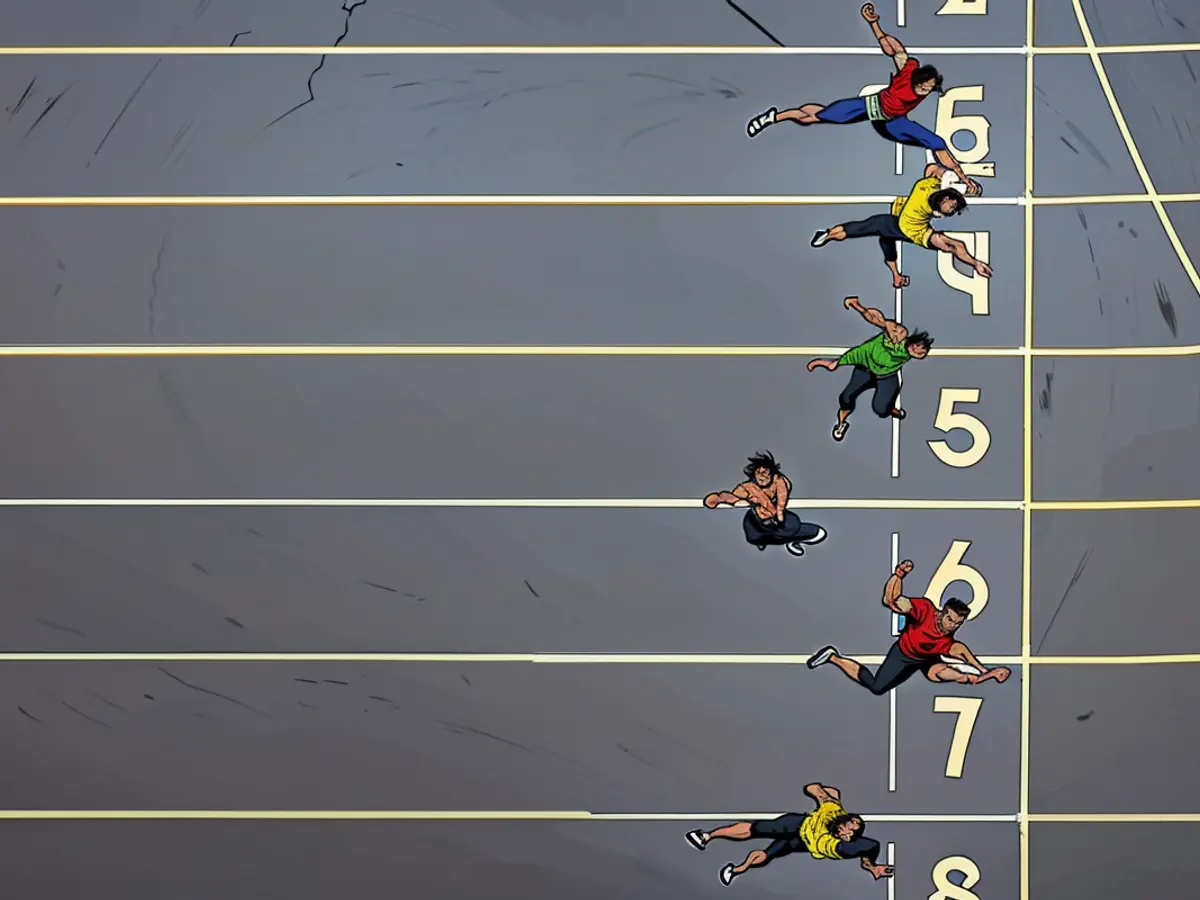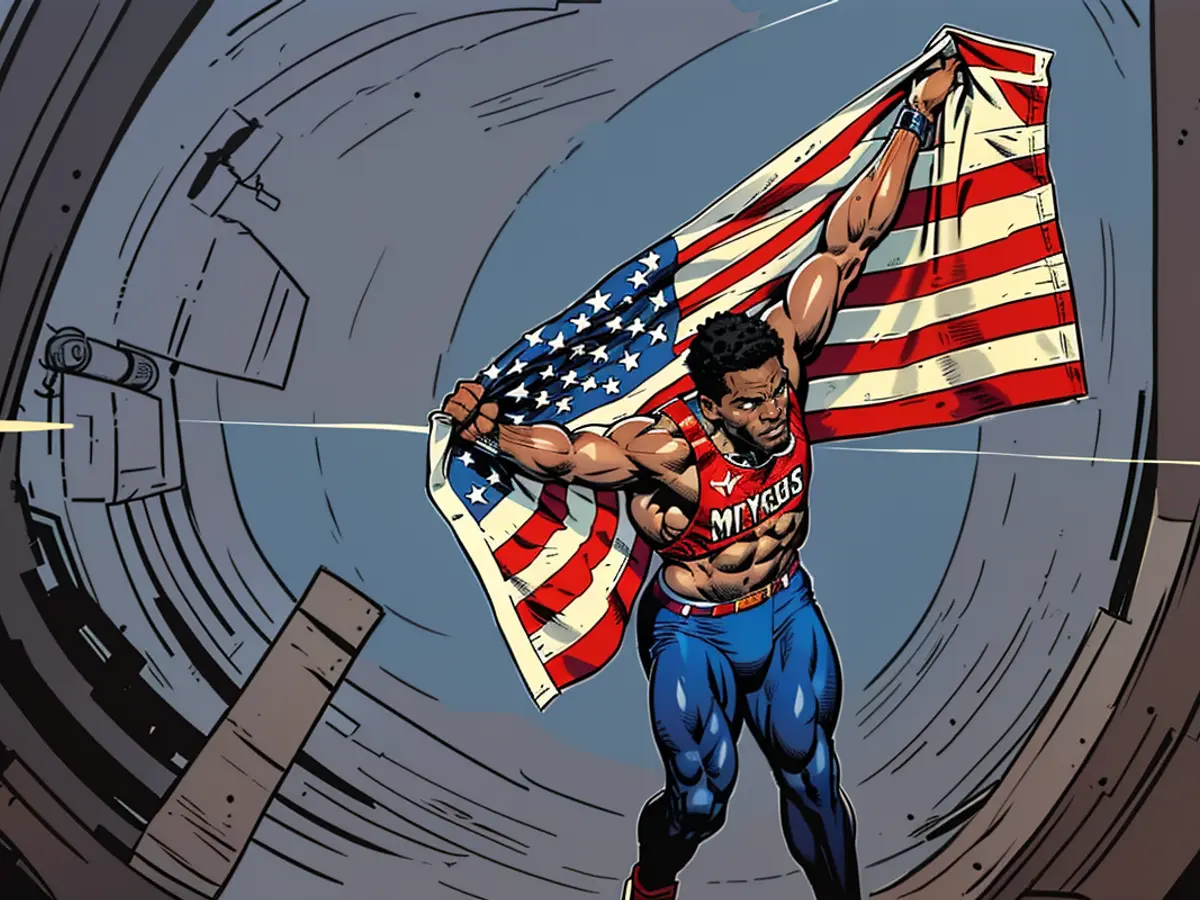The closest 100-meter decision ever made at the Olympics.
The 100-meter sprint is the main event at the Olympic Games. No other competition garners as much global attention as the duel of the fastest men. And in Paris, the protagonists do not disappoint - quite the opposite.
The staging is dramatic. Suddenly, the Stade de France goes dark, and only small, swaying lights on the spectator seats provide a little light. Then a laser and tech show breaks out. The DJ makes the giant stadium tremble. It's the final minutes before the start of the 100 meters. The search is on again for the fastest man in the world, the successor to Olympic sensation Marcell Jacobs of Italy. The defending champion is present but barely made it to the final. He's not a candidate for gold, for another upset. But who is the favorite?
Noah Lyles, the world champion? Of course. Andre De Grasse, the fastest this year? Definitely. Fred Kerley, the man who's lightning-fast over 100, 200, and 400 meters? Always. The list goes on. But, small spoiler alert, the three mentioned win the medals. In the order listed. But what a drama this final is! Thompson and Kerley get off to a good start, Lyles doesn't. He's clearly behind the medal contenders for half the race. Thompson is on a gold course, but then Lyles starts to fly. He passes one after another until he crosses the finish line simultaneously with Jamaican Thompson.
Who is it now? No one knows. Everyone is glued to the scoreboard. Lyles suspects he might not be it. It takes 28 seconds for the result to come in. "I went to Kishane and said, 'I want to be honest, brother, I think you won.' I was prepared for his name to appear, and when I saw mine, I thought, 'Wow, that's incredible. I'm incredible. That's what I wanted, this tough fight against incredible opponents. I'm the wolf among the wolves.' And perhaps the chosen one to become the new face of athletics. The role is vacant without Usain Bolt. Sure, there's pole vault world record holder Mondo Duplantis, there's hurdles star Karsten Warholm, and the provocative Jakob Ingebrigtsen. But a sprinter is a sprinter. The king of all. Always a 'natural born star'. Lyles has charm, courage, a knack for quips, fast legs, and a story that Americans love: humble beginnings, learning difficulties, bullying, depression, and becoming a hero. With four golds?
Primal Scream, Bouncy Ball, Anger
Lyles is a showman, a big mouth, a highly sensitive soul. He makes no secret of his feelings, his struggle with depression. He even talks to his therapist before the final. "She said, 'You have to let go, you have to let it flow.' And I said, 'Okay, I'll trust you.'"
The tension before the start is immense. For instance, the American Kenneth Bednarek runs too fast out of the tunnel during the presentation. He is called back. He doesn't like it. With an annoyed look, he finally comes out again. It's a grand spectacle, the protagonists use the stage for themselves. Sometimes it seems more important to make a show than to win a medal. Thompson lets out a thunderous roar, Lyles sprints like a lion, runs almost half the track, jumps wildly. As cool as the men want to be, so nervous they are. They are in the spotlight of the global public, racehorses that just want to be let loose. But it's not that simple. The preparation drags on, long, very long. Lyles expresses his displeasure with gestures, the colleagues are not happy about the long waiting time either.
Then the shot, then the sprint, then the drama. In the end, there are two 9.79 seconds, a super time. But there is no double gold. Five thousandths of a second make the difference. That's much less than a human blink. In Olympic athletics, there has never been a closer decision. In swimming over 400-meter individual medley in 1972 in Munich, there was once a competition that was even closer. The Swede Gunnar Larsson was then two thousandths of a second faster than the American Tim McKee. A year later, the thousandth of a second was abolished in swimming again.
After 20 years, the sprint nation USA is back on top, where it always and forever wants to be. Where it found no place for a long time because Jamaica, because Usain Bolt dominated. Now Lyles has delivered. He has delivered what he promised. Already at the opening ceremony, he streamed from the boat on the Seine and greeted as the "fastest man in the world". He put himself under pressure. And he wants more. He will win gold over the 200 meters "100 percent". "When I come out of the curve, they will get depressed." The third, Fred Kerley, the man without a smile, had long since joked to him: "Are you talking shit, man?"
The Drama of Tokyo Changed Him
Probably not. Already last year, when he won three gold medals at the World Championships, he announced that a new dynasty was beginning. Before his triumph last year at the home World Championships, he had once again come from a very deep valley. It was a story that the Americans love so much. A hero with a heavy flaw in his resume. In the past two years (and a few months), a lot has happened to him, too much: first the pandemic, then the postponement of the Olympic Games in Tokyo, and finally the Black Lives Matter movement. It went to the limits of endurance, and beyond. The sensitive sprinter struggled more with himself than with his competitors.
In the summer of 2024, Lyles will be forgotten, he is at the top and wants to stay there. He made peace with the games. Three years ago in Tokyo, he suffered from the ghostly corona atmosphere. He needs the stage, the loudness, the push. Over his showcase distance, the 200 meters, he only won bronze. "That's not enough," Lyles swore afterwards. The depressions came back. He focused even more, worked even harder, always looking for new ways to improve even more.
Now the impressive resurrection. He is the star of a Netflix series, a advertising figure. Rapper Snoop Dogg came to watch the Olympic final. "The more eyes on me, the better I am," said the 27-year-old - and then he actually kept his word.
In the world of athletics, Noah Lyles aims to fill the void left by Usain Bolt as the 'natural born star' and the king of sprints. His humble beginnings, struggles with depression, and triumphant story resonate deeply with the American public.
During the dramatic 100-meter final, Lyles delivers an exceptional performance, overtaking his competitors one by one, ultimately tying with Jamaican Thompson for the gold medal. This thrilling race is a testament to Lyles' determination, skills, and his place as a key figure in modern athletics.









